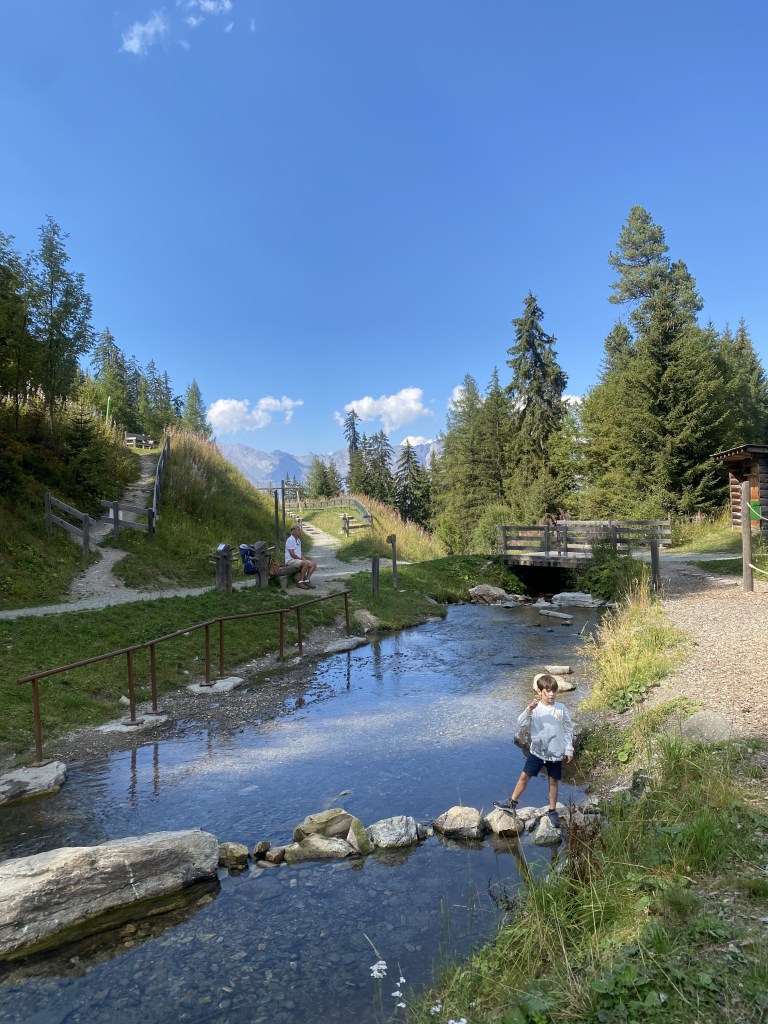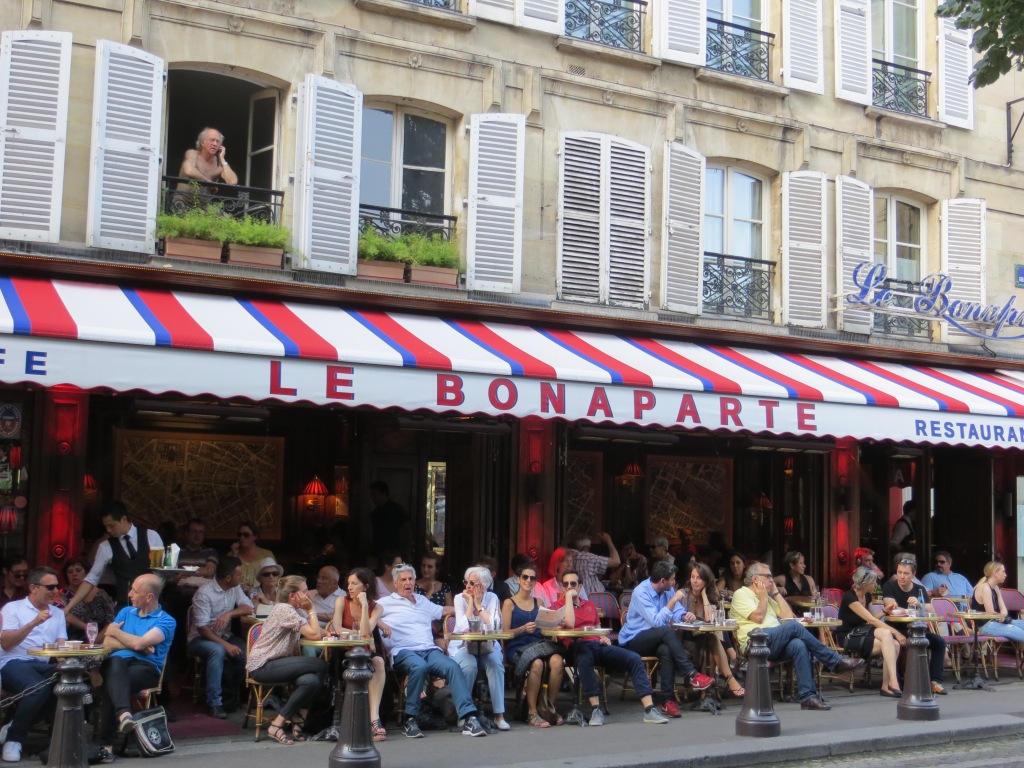Kindergarteners walk to school alone, use knives and cook over open flames. Are Swiss children being given too much freedom or are the rest of us holding on too tightly?

Tourists in Switzerland may find one of the more familiar sights downright shocking – four- and five-year-olds walking around cities without their parents.
The groups of unchaperoned children are usually commuting to and from school – a Swiss rite of passage that kicks off a childhood full of independence and self-reliance. It is no wonder that these two qualities are the cornerstone of Switzerland’s identity.
The path to independence
The practice was born out of necessity, according to locals. Switzerland is a traditionally agrarian country, and running a farm simply didn’t leave parents with extra time. Presumably, this was the same in much of the world a century ago, but the Swiss never let go of their children’s right to independence. About 80% of primary school-aged children in Switzerland walk to school alone – more than twice the rate in the United Kingdom and the United States.
“When children get the chance to create experiences on their own, without the lens of a hovering parent, they realize that they can do much more unaided,” says Basel-area child psychologist Claire Gensetter. “When children achieve something on their own, like walking the correct path home from school, their self-confidence soars. When they fail on their own, they experience that failure as a chance to learn. I’m not saying they enjoyed failing, but they perceive it differently versus when a parent is telling them they failed.”
Swiss children follow one pedestrian path between home and school – mostly down the sidewalks of major streets. Parents will help them the first week or two of school, and then they are off on their own. Other neighbors, pedestrians and crossing guards also help children make their way. Moreover, kids wear yellow and orange reflective badges so cars can see them more easily.

The importance of letting go
“I was terrified at first,” says Kate Thackem. “My daughter is a particularly small four-year-old. It’s not something I’m used to back home in London. Ultimately, I think it is what she is most proud of from her first year at school.”
Children have a natural drive towards autonomy and granting them age-appropriate independence is in supportive of that growth, says Swiss clinical psychologist Dorothe Dörholt. When parents shelter children, they grow up without the necessary skills to cope with hardships.
“Suddenly, they leave school, they go off to university, and the world overwhelms them. They don’t have the tools to deal on their own with the difficulties that they’re facing as young adults,” Dörholt says. But when a child who is being raised with more independence fails, they “realize, ‘Wow, this was difficult. I failed. But I’m still alive. Nothing bad happened, so I can try again.’”
And when children are commuting to and from school alone, they are also the only ones interacting with their teachers. This means it is up to them to carry documents, relay messages and remember important events. My son began his first year of primary school at age four last August in Geneva. When weeks later he told me that he needed to be at school 30 minutes early for a field trip, I didn’t question if he was making it up. He is learning to be responsible for himself.

Back to nature
Swiss children’s independence does not end with their school commute. All Swiss public schools take their students on regular (often weekly) excursions to nature. Students walk hand in hand and take public transportation if necessary to reach nearby forests and fields. The concept of “Forest Schools,” where all education uses naturally available tools, is a German one that is found throughout Switzerland.
In Geneva, this usually means playing by the lake or crossing it by boats. My son reported back to me after one such trip on the gestation period of swan eggs (about 5-6 weeks, if you are curious). On these trips to nature, children will learn to use Swiss Army knives and even cook their own lunches over open flames.
“What I have been most struck by is that these kids, these little kids, go out in any weather – rain, snow, cold – it doesn’t matter,” says Tim LeBranc, an expat from the U.S. “I remember sitting in classrooms instead of going outside for recess when it drizzled in Florida.”
Swiss schools seem to abide by the old adage that “There is no such thing as bad weather, only bad clothing.”

On-campus independence
And back on school grounds, children are given a great deal of freedom to follow their own interests. A formal curriculum – reading, writing and mathematics – does not begin until their third year of primary school, or about age 7.
The first two years are play-based education, focusing on social skills and learning to take care of oneself. Swiss children will begin working on their letters around 7, and within a couple of months they will be reading as well as their counterparts who began at age 4.
Coming from the U.S. where “kindergarten readiness” is a business built on flashcards and handheld “learning” devices, I was seriously worried if a public Swiss school was the right choice for my kindergartener. But as I researched more, I found that many countries employ this approach to education – most famously Norway, which ranks first in literacy with 99% of its population reading. Meanwhile, my home country ranks #125th. And while these statistics may seem like a childish competition, childhood literacy and happiness rates are directly proportional to a country’s future GDP.
At midday, Swiss children have the option to walk home (yes, alone) to eat lunch and then back for the afternoon. Otherwise, they can stay on campus for a freshly prepared meal au restaurant. Children sit at long tables and eat family style, using real glasses, cutlery and plates. At my son’s school in Geneva, older children serve the younger ones (green salad is a staple at every meal) and students clean up after themselves. No bagged lunches from home are allowed, but children do bring fruit for a mid-morning snack, known as z’nüni in Swiss-German or “before noon.”
Students also have access to their own, smaller kitchens on school grounds, where they are allowed to practice their culinary skills – using knives and electric burners. For my son’s fifth birthday, he and a classmate made a banana cake for their peers.

Safety first
It should come as no surprise that Switzerland is often rated among one of the safest countries in the world, as well as having the lowest violent crime rate in Europe. (The kidnapping rate is 0.1% per 100,000 residents.)
When two boys did not come home for lunch last week in Geneva, their parents sent out an alert through a local parenting group. The boys were located within hours at a nearby park and police were not required to get involved. Moreover, no parents at the park called authorities to report unsupervised nine-year-old boys, because it is common to see children playing in parks unchaperoned.
Meanwhile, a U.S. couple was detained by Child Protective Services for allowing their children, ages 10 and six, to play alone at their local park. Another parent called 911 and the children were made to sit in a police car for five hours before their parents were allowed to reunite with them.
“Freedom is an essential part of life,” says Lenore Skenazy, the author of Free-Range Kids. After writing a column about letting her 9-year-old ride the New York subway alone, she became the face of the “free-range” movement in the U.S. She now counsels helicopter parents on her reality show World’s Worst Mom. Skenazy told Expatica that Switzerland provides a good example of not ‘overprotecting’ children.
“I feel like those countries haven’t lost their minds to fear,” she said, adding “People think I’m promoting something new. It’s something old. I’m the opposite of a revolutionary. I’m a reactionary.”





Leave a comment